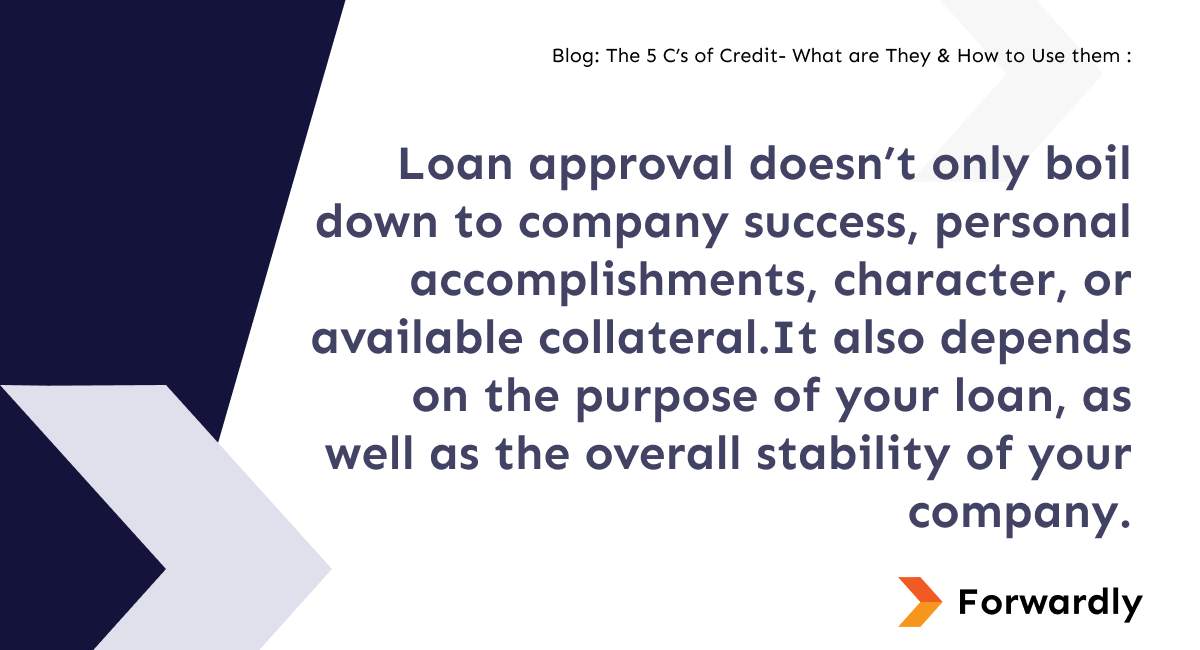Determining your company’s creditworthiness can feel like looking into a crystal ball. Although you might know some of the basics, it’s important to understand the 5 C’s of credit and how they make all the difference when you apply for business financing.
The 5 C’s determine if your company has solid financials and is worthy of financing. They consist of your company’s character (credit history), capacity, capital, collateral, and the conditions of any loan offered. These key indicators help lenders get a rough sketch of whether your business is creditworthy — or if there is a risk that you won’t be able to repay your debts.
Breaking down the 5 C’s of credit
Lenders review mountains of credit applications every year, and statistics point toward this mountain growing even higher in the coming years. As a result, there’s just not enough time to go beyond the 5 C’s to evaluate your company’s credit risk.
The components represent the major determinants of your credit risk. Each element details how you manage finances, pay back lenders, and what would-be lenders can offer you. Here’s what each of the 5 C’s of credit means and how they impact your creditworthiness:
Character (credit history)
When lenders look into your company’s character, they’re determining your trustworthiness as a borrower. These factors consist of business experience, financial acumen, educational background, and a good track record of paying back any previous or existing debts. This is where your personal and professional accomplishments can make an impact. The more you’re able to convince lenders that you’ve got what it takes to build (and maintain) a successful business, the better your character appears.
Don’t be shy about your credentials if you want to ace your company’s character assessment. Mention any successful businesses you’ve started in the past, educational achievements, and prior instances where you’ve paid off loans on time. Include high-quality references from prior business associates and detail the professional experiences that you, your business partners, and your employees have (especially if they’re brag-worthy).
Capacity
Capacity evaluates your company’s cash flow, and whether or not it has the capacity to repay the loan. Lenders don’t want to finance a business that may not have the income or resources to make repayment a sure thing. Lenders will look at the cash flow statements your company submitted as part of your loan application. They may also look at how long a company has been in business as a determinant of its financial health.
Capital
Lenders like it when business owners invest some of their own money to get their company up and running. It signals that the founders are committed to their venture’s success. If you have not made a personal investment in your company (if you launched with external capital or startup funding, for example), you may not represent the kind of capital commitment most lenders would want to see.
Collateral
In addition to capital, lenders also want to know what assets you can use to secure your loan. Collateral can consist of liquid assets (your company’s cash), equipment, real estate, unpaid invoices, or other property. Secured business loans require collateral in exchange for approval, which allows your lender to seize your assets in the event that you can’t pay what you owe.
Not every loan requires collateral, however. Unsecured business loans give borrowers access to cash without offering their company’s assets in return. These loans are often easier to obtain than secured business loans but require personal guarantees of repayment from applicants (meaning that you’re going to pay personally if your business can’t).
Conditions
Loan approval doesn’t only boil down to company success, personal accomplishments, character, or available collateral. It also depends on the purpose of your loan, as well as the overall stability of your company. These are also known as a loan’s conditions.

For example, the conditions of your loan appear more stable if you’re using it to buy the materials needed to fulfil purchase orders. If you’re looking for general working capital to cover operating costs; however, your conditions may be less desirable. The logic behind these decisions has to do with whether or not your company’s underlying financials are strong.
Financing new business opportunities for a successful company is much different than financing operational costs for a business that might not be turning enough of a profit on its own. The former is less risky than the latter, which is more appealing to lenders.
The bonus C: Communication
Communication is also a determining factor of whether or not you’re a good business partner. Conveying your company’s challenges and opportunities during the loan application process shows transparency and helps build trust between you and your lender.
So, there you have it—those are the 5 C’s of credit that can make or break your shot at securing financing for your business. It’s not just about numbers on a balance sheet; it’s about showing lenders that you’ve got the character, capacity, and commitment to make those repayments.
And remember, you don’t always need extra capital if your cash flow is in good shape. With Forwardly, you can keep your business running smoothly without the added debt. Keep your cash flow healthy by paying your bills on time, receiving business payments instantly in just 60 seconds, and staying in control of your finances with cash flow forecasts and financial reports. Best of all, there are no subscription fees, and paying your business bills is totally free with Forwardly.
Ready to take charge of your financial future? Sign up for free with Forwardly today! It’s the smart move to keep your business finances in check and running smoothly.
 Back to Blog
Back to Blog


